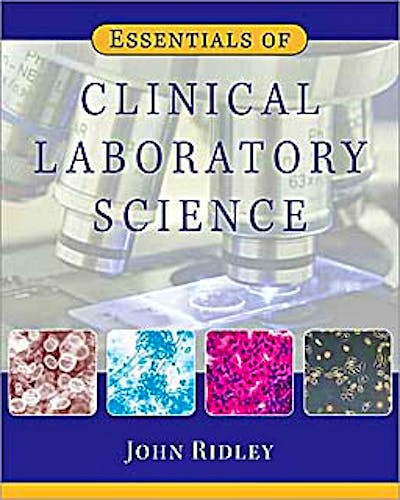

No hay productos en el carrito



Essentials of Clinical Laboratory Science
Ridley, J.
1ª Edición Junio 2010
Inglés
481 pags
1400 gr
null x null x null cm
ISBN 9781435448148
Editorial DELMAR
LIBRO IMPRESO
-5%
38,27 €36,36 €IVA incluido
36,80 €34,96 €IVA no incluido
Recíbelo en un plazo de
2 - 3 semanas
Description
Guide and organize the evolution of your clinical laboratory students from beginners into effective professionals by giving them this invaluable resource, Essentials of Clinical Laboratory Science. This text fosters critical thinking beyond just the basic procedures, creating a thorough awareness of the clinical laboratory responsibilities that students will have to themselves, to their patients, and to the facilities where they work. Coverage includes the organization of health care facilities, the laws and regulations that govern them, and common tasks and responsibilities for the numerous professional categories that comprise the health care industry. Safety for the laboratory employee, the patients, and the visitors are explained in detail. With an emphasis on efficiency, accuracy, and professionalism, this book serves up the essential ingredients for a holistic approach to laboratory science that augments the diagnosis and treatment of all patients.
Features
- Enhances basic knowledge of each department in the clinical laboratory with selected procedures from all major laboratory divisions in the concluding chapters.
- Addresses general mathematics and algebra, exploring the scope of applicable math for quality control and for calculating results, including the metric system.
- Covers organization of health care facilities, the laws and regulations that govern them, and common tasks and responsibilities for the numerous professional categories that comprise the health care industry.
- Rounds out already comprehensive coverage with valuable supplementary information found in the appendices, including states and territories with laboratory personnel licensure requirements, medical terminology for laboratorians, accrediting agencies, and professional societies.
Table of Contents
Preface.
For Whom is This Book Written?.Why This Book Was Written. About the Author.
Organization of the Textbook. History of the Laboratory. Laboratory Duties and
Professionalism. Organization of the Health Care Facility and the Laboratory.
Accreditation of Facilities and Personnel Certification. Laboratory Economics
Laboratory Mathematics. Quality Assurance. Safety in the Laboratory and Patient
Areas. Infection Control. Clinical Laboratory Procedures
1. History and Development of Medical Laboratory Science.
2. Laboratory Personnel Credentialing and Facility Accreditation.
3. Medical Law, Ethics and Moral Issues of Healthcare.
4. Hospital and Laboratory Organization.
5. Laboratory Safety.
6. Introduction to Infection Control.
7. Medical Economics and Laboratory Equipment.
8. Pipetting and Use of Glassware.
9. Laboratory Mathematics.
10. Quality Assurance.
11. Phlebotomy.
12. Procedures for Urinalysis and Body Fluids.
13. Hematology and Coagulation.
14. Clinical Chemistry.
15. Microbiology.
16. Immunology and Serology.
17. Immunohematology (Blood Banking).
Glossary.
Appendix A: States and Territories Having Laboratory Personnel Licensure Requirements.
Appendix B: Medical Terminology for Laboratorians.
Appendix C: Accrediting Agencies and Professional Societies.
Appendix D: Review Question Answers.
About the Author
Dr. John W. Ridley has a wealth of experience in the medical field, in a variety of positions, both civilian and military. He began his career as a patient care technician before going to serve during the Vietnam conflict as a combat medic. He then worked as a trainer for combat medics, until he received an appointment to the laboratory training program at Brooke Army Medical Center, Ft. Sam, Houston, TX. He served three years of active duty as a medical laboratory technician and then pursued his BS degree in Zoology and his Master’s of Education degree, both from the University of Georgia. During this time, his work experience included positions as a laboratory technician and later a technologist, then a clinical laboratory manager and as an officer in several US Army Reserve Combat Support Hospitals, rising to the rank of Colonel. Dr. Ridley completed a Ph.D. in Health and Human Services shortly after completing a tour of duty in Desert Shield/Desert Storm. He then completed his education as a registered nurse, which allowed him to incorporate the critical clinical perspective into his role as an educator, which began in 1992, and continues today. Dr. Ridley is currently the Director of Medical Laboratory Technology at West Central Technical College in Waco, Georgia.
© 2025 Axón Librería S.L.
2.149.0